The Absurdity of Iowa
Cold hard facts.
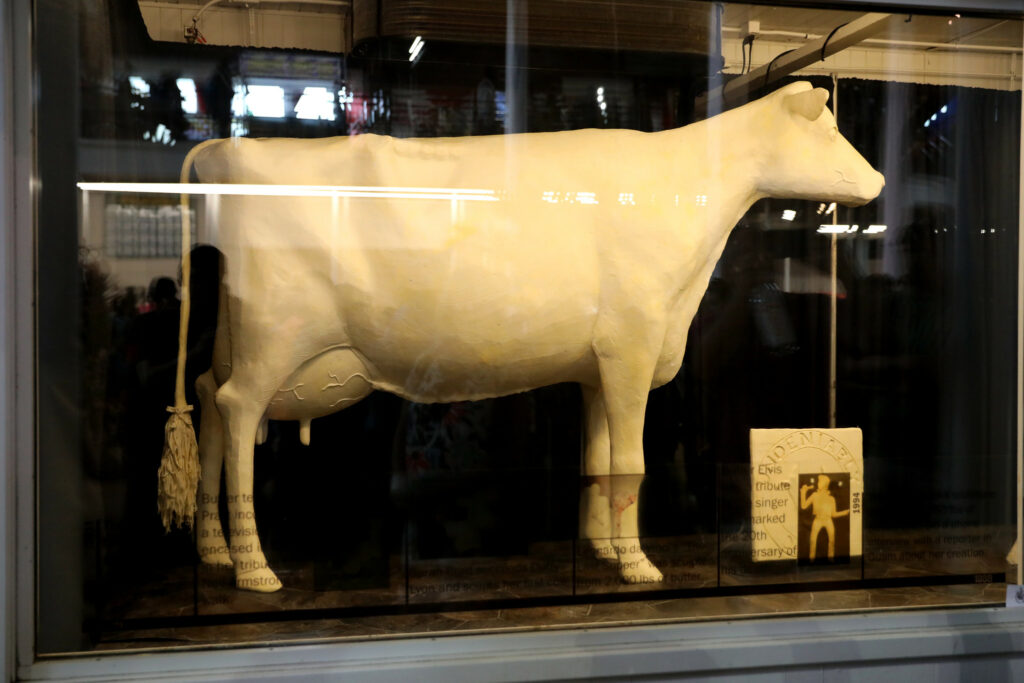
In reading pieces like Iowa’s deep freeze scrambles caucus turnout tactics for GOP campaigns (WaPo), I can’t help but reflect on the absurdity of this process. Why is voting starting in January? Why is Iowa even a thing?
In simple terms, it is an odd choice, from an efficacy standpoint, to schedule a series of potentially hours-long meetings in the middle of winter on a Monday night. It is as if the designers of the process asked themselves what format would result in the lowest turnout and picked it. In other words, if the goal is the actual participation of Iowans, this isn’t the route.
And an already byzantine process is going to be further complicated by the weather.
The process dates to the early 20th Century, and it was nothing more than a beauty contest (i.e., had no formal role in picking the candidate until after reforms were put into place in 1972). The Iowa caucuses themselves came to national prominence because they helped propel Jimmy Carter to the nomination in 1976.
And, of course, as the WSJ notes, it has all become big business: How Iowa Turned the Caucuses Into a Gold Mine (which explains why they fight so hard to keep its place in the overall process).
More than $105 million has been spent by the Republican presidential candidates and their allies on Iowa ads during the past year, data from AdImpact shows. That compares with roughly $53 million expended by Democrats and their allies during a similar period four years ago, when that party held competitive caucuses.
That is just advertising. The state also brings in millions of dollars more in hotel receipts, restaurant bookings, event production, office space, rental cars and the sale of voter databases.
Iowa and New Hampshire—the leadoff states in the Republican nomination process—have long enjoyed the financial and publicity windfall generated by hosting the first contests. It is a big reason party officials in both states fight so hard to keep their lucrative franchise.
Objectively speaking, there is no good reason to have to have voting in this process start in January. There is no good reason to use the caucus format. There is no argument that logically champions Iowa as the place to begin. And so on, and so on.
Really, the entire primary process makes little sense. It isn’t as if there aren’t national sentiments about the candidates. The notion that the candidates are winning over the electorate state-by-state is simply not true.
This is simply a case of we do it this way because, well, it seems like we always have.
Indeed, if you stop and think about the various pro-state-by-state primary arguments that sound very much like the kinds of things we talk ourselves into because we are retrospectively trying to justify the absurd. For example, the idea that “retail politics” (e.g., talking to people in diners) is a good way to vet candidates to be POTUS is more than a bit silly.
Process matters and it seems relevant to ask how this process promotes the kinds of skills needed to the the chief executive of a global superpower.

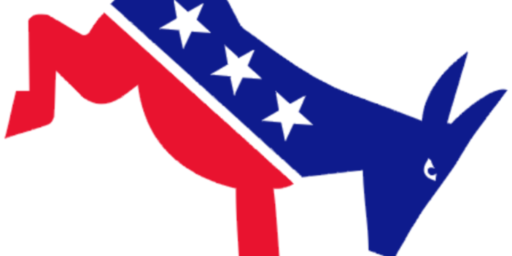
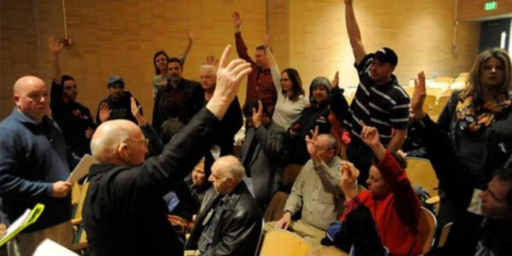
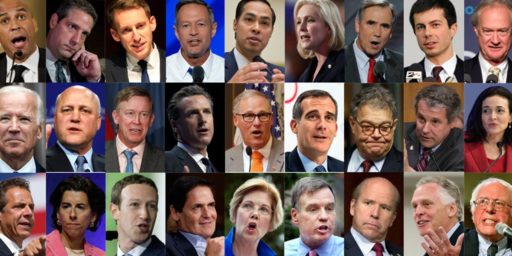
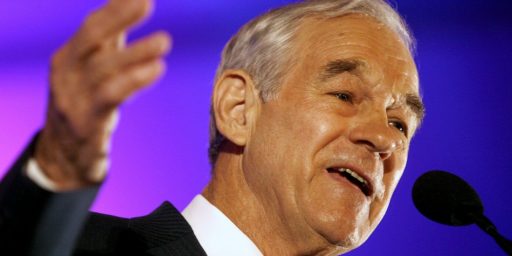
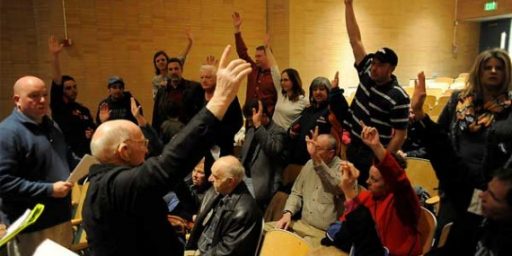
Say what you will, the Iowa caucuses brought us ethanol blended gasoline. Because turning food, fodder really, into carbon based fuel makes so much sense otherwise. /s
Our whole method of selecting leaders, particularly for president, but also for most offices is bizarre, so why not Iowa and NH? The selection process wouldn’t be any less bizarre if CA and TX went first, it would simply be more expensive and the accident of Carter, Clinton or McGovern breaking through would be diminished.
@Sleeping Dog: You are kind of making the point of my conclusion: you are buying the notion that it has to be a state-by-state sequence, which is simply not the case.
But even noting that, I will push back and note that both CA and TX are more populated, and more diverse than IA or NH. CA Republicans are almost certainly a better proxy for national preferences than are IA GOPers.
My own fantasy is that there be a coalition of large states with sufficient delegates to choose the candidates that get together and not hold their primaries until June. Texas, California, NY, Illinois, Florida, etc. The top 10 states would be populous enough, diverse enough, regional enough to cover the ground.
Yes, but this allows platoons of political reporters to portray themselves as savvy, world-weary truth-tellers by talking to know-nothings in diners and then filing endless stories about them.
@Steven L. Taylor:
100% this. It gets back to a point I was trying to make a few days ago that, while having democratic components, ultimately it primary system isn’t particularly democratic.
While we have a weak party system here, we also have a weak democratic selection system.
@Steven L. Taylor:
100% this. It gets back to a point I was trying to make a few days ago that, while having democratic components, ultimately it primary system isn’t particularly democratic.
While we have a weak party system here, we also have a weak democratic selection system.
@Steven L. Taylor:
What I’m saying is the whole selection process doesn’t make any sense, so it doesn’t matter who goes first. A polished turd is still a turd. Until trump, we’ve been pretty lucky in dodging truly awful candidates, but our luck has run out.
Mr. Smith, you’ll be glad to know the Doc said we can remove that skin tag, but can’t do anything about your pancreatic cancer.
Nothing matters. The GOP is going to saddle this country with a knowingly flawed candidate no matter which state “goes first.”
Iowa and New Hampshire will continue to press for being first, because for state officials to abandon this is to piss off the business community in each state BADLY.
@mattbernius:
I’ve been wondering about this and is the solution to make everything a “jungle”* primary?
That way in say deep Red places the ultimate choice would likely be between two flavors of Republican and not a Republican that’s going to win because of crazy primary voters vs a Dem that’s going to lose no matter what.
*I dont know why but I hate that it’s branded as Jungle. It feels like it’s got a vaguely racist connotation. Like some racist is trying to sneak something in.
We’re a republic, not a democracy.
By which I mean that a large chunk of our society has rejected majority rule and anything that can lead to majority rule. Those people will make it to the caucuses.
@Steven L. Taylor:
I’m not so sure. A lot of CA Republicans get to enjoy the purity of insane political views without any of the consequences of seeing them actually happen and living with the results.
On the other hand, FL Republicans exist, so maybe there is no feedback loop. But if there was an effective feedback loop, a lot of CA Republicans wouldn’t be affected by it. Now I’m wondering if Oklahoma Democrats are socialists.
@Sleeping Dog:
I’m a Californian … and I used to complain that CA existed only as an ATM for candidates, that the race was usually long-decided before a primary ballot was cast here.
Now, I think differently. First, I definitely wouldn’t want this, or any, Republican crew campaigning for 4-6 months here, each of them knowing full well that a first-up win in CA would be a HUGE accelerant for any of them going forward. Second, I’d rather Iowa and NH experience months of door-to-door, Pizza Ranch to Pizza Ranch, talk and photo-ops. It serves to vet them, and tends to weed out a few of them – like Pence and Christie. And LOOK: we have yet to have one of their Quaint and famous fraudulent caucus votes.
Giving California the first primary would kill the primary system for good; that may not be a bad thing. Read The Making of the President: 1960. You’ll think you’re reading about another country. JFK didn’t declare until late January of that year. The primaries weren’t seen as the be all and end all of the nominating process. The idea was that the party bosses wanted to see if you could actually get people to vote for you. Win a couple primaries, sit out the rest (which often went for “favorite son” candidates–a local governor or a senator from that party), and go to the convention and start making deals to get the votes you needed.
The negative is obvious; the nominee is largely determined by party apparatchiks and not by the people. That’s also the positive.
The whole never-ending election campaign is the main reason US politics are so dysfunctional, IMHO. The news media reporting excitedly on a daily basis on candidates for an election up to three years before it happens would be regarded as insane in any other country.
If there must be primaries, have them all on the same day, a month before the conventions. Better still, have registered members of each party elect their nominee directly by an online poll. The best feature of such a change is that unlike most other desirable fixes to the political system, it doesn’t need any changes to the constitution.
@Sleeping Dog:
I would note that when I write about larger reform issues, people tell me I am being unrealistic.
It’s like a guy can’t win 😉
@Brainster:
Years of consideration have led me to conclude that that is a preferable process.
@Ken_L:
100%. It is not healthy. There is no incentive to actually govern, especially in the House with its 2-year terms.
@Ken_L:..it doesn’t need any changes to the constitution.
How easy will it be to get all 50 state legislatures and the national and state Democratic and Republican parties to agree to a single date for primary elections selecting candidates for President USA and for US congressional candidates? If these primary elections are to be held one month before the national political party conventions the Democrats and the Republicans will have to hold their conventions at the same time. Somehow I suspect that the TV networks will squeal about this.
@Beth: Open (Jungle) Primaries work very well where they have been tried, but the parties themselves *hate* them because of the loss of power.
My hope is that the experiment expands nationally and we lose some of the most radical candidates that are in Congress today.
But first we have to resolve an existential threat – the modern Republican party and it’s felonious leader.
Our absurd primary process exists, and will continue to exist, because it is a cash cow for the vaunted 4th Estate. Yes, Iowa and New Hampshire hotels, restaurants and for-rent office space owners get a significant boost to their bottom line every 4 years, but the local radio, TV and newspapers reap a windfall that otherwise wouldn’t happen. No media executive is going to push for an end to presidential campaigns that last 2 years when such campaigns spend literally millions of dollars on advertising. Too many people are making too much money for any changes to be made. The media knows this, and so did the Supreme Court justices who blessed it with the Citizens United decision.